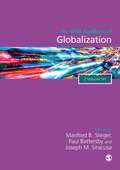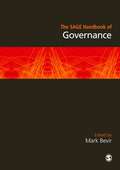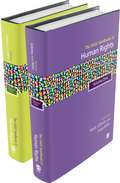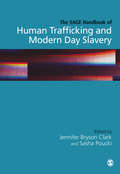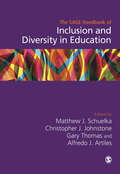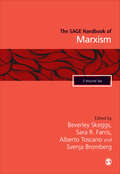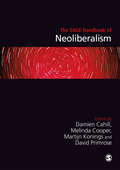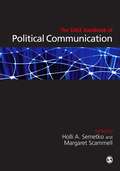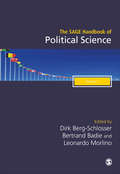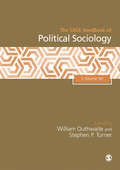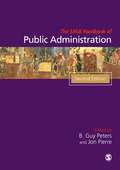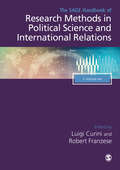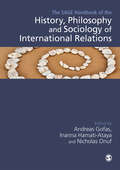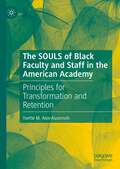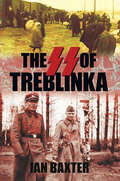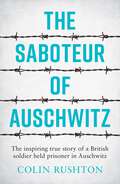- Table View
- List View
The SAGE Handbook of Globalization
by Joseph M. Siracusa Manfred B. Steger Paul BattersbyGlobal studies is a fresh and dynamic discipline area that promises to reinvigorate undergraduate and postgraduate education in the social sciences and humanities. In the Australian context, the interdisciplinary pedagogy that defines global studies is gaining wider acceptance as a coherent and necessary approach to the study of global change. Through the Global Studies Consortium (GSC), this new discipline is forming around an impressive body of international scholars who define their expertise in global terms. The GSC paves the way for the expansion of global studies programs internationally and for the development of teaching and research collaboration on a global scale. Mark Juergensmeyer and Helmut Anheier’s forthcoming Encyclopaedia of Global Studies with SAGE is evidence of this growing international collaboration, while the work of Professor Manfred Steger exemplifies the flourishing academic literature on globalization. RMIT University’s Global Cities Institute represents a substantial institutional investment in interdisciplinary research into the social and environmental implications of globalization in which it leads the way internationally. Given these developments, the time is right for a book series that draws together diverse scholarship in global studies. This Handbook allows for extended treatment of critical issues that are of major interest to researchers and students in this emerging field. The topics covered speak to an interdisciplinary approach to the study of global issues that reaches well beyond the confines of international relations and political science to encompass sociology, anthropology, history, media and cultural studies, economics and governance, environmental sustainability, international law and criminal justice. Specially commissioned chapters explore diverse subjects from a global vantage point and all deliberately cohere around core "global" concerns of narrative, praxis, space and place. This integrated approach sets the Handbook apart from its competitors and distinguishes Global Studies as the most equipped academic discipline with which to address the scope and pace of global change in the 21st century.
The SAGE Handbook of Globalization
by Professor Manfred B. Steger Professor Joseph M Siracusa Paul BattersbyGlobal studies is a fresh and dynamic discipline area that promises to reinvigorate undergraduate and postgraduate education in the social sciences and humanities. In the Australian context, the interdisciplinary pedagogy that defines global studies is gaining wider acceptance as a coherent and necessary approach to the study of global change. Through the Global Studies Consortium (GSC), this new discipline is forming around an impressive body of international scholars who define their expertise in global terms. The GSC paves the way for the expansion of global studies programs internationally and for the development of teaching and research collaboration on a global scale. Mark Juergensmeyer and Helmut Anheier’s forthcoming Encyclopaedia of Global Studies with SAGE is evidence of this growing international collaboration, while the work of Professor Manfred Steger exemplifies the flourishing academic literature on globalization. RMIT University’s Global Cities Institute represents a substantial institutional investment in interdisciplinary research into the social and environmental implications of globalization in which it leads the way internationally. Given these developments, the time is right for a book series that draws together diverse scholarship in global studies. This Handbook allows for extended treatment of critical issues that are of major interest to researchers and students in this emerging field. The topics covered speak to an interdisciplinary approach to the study of global issues that reaches well beyond the confines of international relations and political science to encompass sociology, anthropology, history, media and cultural studies, economics and governance, environmental sustainability, international law and criminal justice. Specially commissioned chapters explore diverse subjects from a global vantage point and all deliberately cohere around core “global” concerns of narrative, praxis, space and place. This integrated approach sets the Handbook apart from its competitors and distinguishes Global Studies as the most equipped academic discipline with which to address the scope and pace of global change in the 21st century.
The SAGE Handbook of Governance
by Mark BevirThe study of governance has risen to prominence as a way of describing and explaining changes in our world. The SAGE Handbook of Governance presents an authoritative and innovative overview of this fascinating field, with particular emphasis on the significant new and emerging theoretical issues and policy innovations. The Handbook is divided into three parts. Part one explores the major theories influencing current thinking and shaping future research in the field of governance. Part two deals specifically with changing practices and policy innovations, including the changing role of the state, transnational and global governance, markets and networks, public management, and budgeting and finance. Part three explores the dilemmas of managing governance, including attempts to rethink democracy and citizenship as well as specific policy issues such as capacity building, regulation, and sustainable development. This volume is an excellent resource for advanced students and researchers in political science, economics, geography, sociology, and public administration. Mark Bevir is a Professor of Political Science at the University of California, Berkeley.
The SAGE Handbook of Human Rights: Two Volume Set
by Mark Gibney Anja MihrThe SAGE Handbook of Human Rights will comprise a two volume set consisting of more than 50 original chapters that clarify and analyze human rights issues of both contemporary and future importance. The Handbook will take an inter-disciplinary approach, combining work in such traditional fields as law, political science and philosophy with such non-traditional subjects as climate change, demography, economics, geography, urban studies, mass communication, and business and marketing. In addition, one of the aspects of mainstreaming is the manner in which human rights has come to play a prominent role in popular culture, and there will be a section on human rights in art, film, music and literature. Not only will the Handbook provide a state of the art analysis of the discipline that addresses the history and development of human rights standards and its movements, mechanisms and institutions, but it will seek to go beyond this and produce a book that will help lead to prospective thinking.
The SAGE Handbook of Human Rights: Two Volume Set
by Mark Gibney Anja MihrThe SAGE Handbook of Human Rights will comprise a two volume set consisting of more than 50 original chapters that clarify and analyze human rights issues of both contemporary and future importance. The Handbook will take an inter-disciplinary approach, combining work in such traditional fields as law, political science and philosophy with such non-traditional subjects as climate change, demography, economics, geography, urban studies, mass communication, and business and marketing. In addition, one of the aspects of mainstreaming is the manner in which human rights has come to play a prominent role in popular culture, and there will be a section on human rights in art, film, music and literature. Not only will the Handbook provide a state of the art analysis of the discipline that addresses the history and development of human rights standards and its movements, mechanisms and institutions, but it will seek to go beyond this and produce a book that will help lead to prospective thinking.
The SAGE Handbook of Human Trafficking and Modern Day Slavery
by Jennifer Bryson Clark Sasha PouckiMillions of people around the world are forced to work without pay and under threat of violence. These individuals can be found working in brothels, factories, mines, farm fields, restaurants, construction sites and private homes: many have been tricked by human traffickers and lured by false promises of good jobs or education, some are forced to work at gunpoint, while others are trapped by phony debts from unscrupulous moneylenders. The SAGE Handbook of Human Trafficking and Modern-Day Slavery provides a comprehensive, interdisciplinary and global look at the diverse issues surrounding human trafficking and slavery in the post-1945 environment. Covering everything from history, literature and politics to economics, international law and geography, this Handbook is essential reading for academics and researchers, as well as for policy-makers and non-governmental organisations
The SAGE Handbook of Human Trafficking and Modern Day Slavery
by Jennifer Bryson Clark Sasha PouckiMillions of people around the world are forced to work without pay and under threat of violence. These individuals can be found working in brothels, factories, mines, farm fields, restaurants, construction sites and private homes: many have been tricked by human traffickers and lured by false promises of good jobs or education, some are forced to work at gunpoint, while others are trapped by phony debts from unscrupulous moneylenders. The SAGE Handbook of Human Trafficking and Modern-Day Slavery provides a comprehensive, interdisciplinary and global look at the diverse issues surrounding human trafficking and slavery in the post-1945 environment. Covering everything from history, literature and politics to economics, international law and geography, this Handbook is essential reading for academics and researchers, as well as for policy-makers and non-governmental organisations
The SAGE Handbook of Inclusion and Diversity in Education
by Gary Thomas Alfredo J. Artiles Matthew J. Schuelka Christopher J. JohnstoneThis handbook examines policy and practice from around the world with respect to broadly conceived notions of inclusion and diversity within education. It sets out to provide a critical and comprehensive overview of current thinking and debate around aspects such as inclusive education rights, philosophy, context, policy, systems, and practices for a global audience. This makes it an ideal text for researchers and those involved in policy-making, as well as those teaching in classrooms today. Chapters are separated across three key parts: Part I: Conceptualizations and Possibilities of Inclusion and Diversity in Education Part II: Inclusion and Diversity in Educational Practices, Policies, and Systems Part III: Inclusion and Diversity in Global and Local Educational Contexts
The SAGE Handbook of Marxism
by Beverley Skeggs Sara R. Farris Alberto Toscano Svenja BrombergThe past decade has witnessed a resurgence of interest in Marxism both within and without the academy. Marxian frameworks, concepts and categories continue to be narratively relevant to the features and events of contemporary capitalism. Most crucially, an attention to shifting cultural conditions has lead contemporary researchers to re-confront some classical and essential Marxist concepts, as well as elaborating new critical frameworks for the analysis of capitalism today. The SAGE Handbook of Marxism showcases this cutting-edge of today’s Marxism. It advances the debate with essays that rigorously map and renew the concepts that have provided the groundwork and main currents for Marxist theory, and showcases interventions that set the agenda for Marxist research in the 21st century. A rigorous and challenging collection of scholarship, this book contains a stunning range of contributions from contemporary academics, writers and theorists from around the world and across disciplines, invaluable to scholars and graduate students alike. Part 1: Reworking the critique of political economy Part 2: Forms of domination, subjects of struggle Part 3: Political perspectives Part 4: Philosophical dimensions Part 5: Land and existence Part 6: Domains Part 7: Inquiries and debates
The SAGE Handbook of Marxism
by Beverley Skeggs Sara R. Farris Alberto Toscano Svenja BrombergThe past decade has witnessed a resurgence of interest in Marxism both within and without the academy. Marxian frameworks, concepts and categories continue to be narratively relevant to the features and events of contemporary capitalism. Most crucially, an attention to shifting cultural conditions has lead contemporary researchers to re-confront some classical and essential Marxist concepts, as well as elaborating new critical frameworks for the analysis of capitalism today. The SAGE Handbook of Marxism showcases this cutting-edge of today’s Marxism. It advances the debate with essays that rigorously map and renew the concepts that have provided the groundwork and main currents for Marxist theory, and showcases interventions that set the agenda for Marxist research in the 21st century. A rigorous and challenging collection of scholarship, this book contains a stunning range of contributions from contemporary academics, writers and theorists from around the world and across disciplines, invaluable to scholars and graduate students alike. Part 1: Reworking the critique of political economy Part 2: Forms of domination, subjects of struggle Part 3: Political perspectives Part 4: Philosophical dimensions Part 5: Land and existence Part 6: Domains Part 7: Inquiries and debates
The SAGE Handbook of Neoliberalism
by Martijn Konings Damien Cahill Melinda Cooper David PrimroseOver the last two decades, ‘neoliberalism’ has emerged as a key concept within a range of social science disciplines including sociology, political science, human geography, anthropology, political economy, and cultural studies. The SAGE Handbook of Neoliberalism showcases the cutting edge of contemporary scholarship in this field by bringing together a team of global experts. Across seven key sections, the handbook explores the different ways in which neoliberalism has been understood and the key questions about the nature of neoliberalism: Part 1: Perspectives Part 2: Sources Part 3: Variations and Diffusions Part 4: The State Part 5: Social and Economic Restructuring Part 6: Cultural Dimensions Part 7: Neoliberalism and Beyond This handbook is the key reference text for scholars and graduate students engaged in the growing field of neoliberalism.
The SAGE Handbook of Neoliberalism
by Martijn Konings Damien Cahill Melinda Cooper David PrimroseOver the last two decades, ‘neoliberalism’ has emerged as a key concept within a range of social science disciplines including sociology, political science, human geography, anthropology, political economy, and cultural studies. The SAGE Handbook of Neoliberalism showcases the cutting edge of contemporary scholarship in this field by bringing together a team of global experts. Across seven key sections, the handbook explores the different ways in which neoliberalism has been understood and the key questions about the nature of neoliberalism: Part 1: Perspectives Part 2: Sources Part 3: Variations and Diffusions Part 4: The State Part 5: Social and Economic Restructuring Part 6: Cultural Dimensions Part 7: Neoliberalism and Beyond This handbook is the key reference text for scholars and graduate students engaged in the growing field of neoliberalism.
The SAGE Handbook of Political Communication
by Dr Margaret Scammell Holli A SemetkoThis authoritative and comprehensive survey of political communication draws together a team of the world's leading scholars to provide a state-of-the-art review that sets the agenda for future study. It is divided into five sections: Part One: explores the macro-level influences on political communication such as the media industry, new media, technology, and political systems Part Two: takes a grassroots perspective of the influences of social networks - real and online - on political communication Part Three: discusses methodological advances in political communication research Part Four: focuses on power and how it is conceptualized in political communication Part Five: provides an international, regional, and comparative understanding of political communication in its various contexts The SAGE Handbook of Political Communication is an essential benchmark publication for advanced students, researchers and practitioners in the fields of politics, media and communication, sociology and research methods.
The SAGE Handbook of Political Science
by Dirk Berg-Schlosser Leonardo Morlino Bertrand BadieThe SAGE Handbook of Political Science presents a major retrospective and prospective overview of the discipline. Comprising three volumes of contributions from expert authors from around the world, the handbook aims to frame, assess and synthesize research in the field, helping to define and identify its current and future developments. It does so from a truly global and cross-area perspective Chapters cover a broad range of aspects, from providing a general introduction to exploring important subfields within the discipline. Each chapter is designed to provide a state-of-the-art and comprehensive overview of the topic by incorporating cross-cutting global, interdisciplinary, and, where this applies, gender perspectives. The Handbook is arranged over seven core thematic sections: Part 1: Political Theory Part 2: Methods Part 3: Political Sociology Part 4: Comparative Politics Part 5: Public Policies and Administration Part 6: International Relations Part 7: Major Challenges for Politics and Political Science in the 21st Century
The SAGE Handbook of Political Science
by Dirk Berg-Schlosser Leonardo Morlino Bertrand BadieThe SAGE Handbook of Political Science presents a major retrospective and prospective overview of the discipline. Comprising three volumes of contributions from expert authors from around the world, the handbook aims to frame, assess and synthesize research in the field, helping to define and identify its current and future developments. It does so from a truly global and cross-area perspective Chapters cover a broad range of aspects, from providing a general introduction to exploring important subfields within the discipline. Each chapter is designed to provide a state-of-the-art and comprehensive overview of the topic by incorporating cross-cutting global, interdisciplinary, and, where this applies, gender perspectives. The Handbook is arranged over seven core thematic sections: Part 1: Political Theory Part 2: Methods Part 3: Political Sociology Part 4: Comparative Politics Part 5: Public Policies and Administration Part 6: International Relations Part 7: Major Challenges for Politics and Political Science in the 21st Century
The SAGE Handbook of Political Sociology, 2v
by Stephen P. Turner Professor William OuthwaiteThe SAGE Handbook of Political Sociology offers a comprehensive and contemporary look at this evolving field of study. The focus is on political life itself and the chapters, written by a highly-respected and international team of authors, cover the core themes which need to be understood in order to study political life from a sociological perspective, or simply to understand the political world. The two volumes are structured around five key areas: PART 1: TRADITIONS AND PERSPECTIVES PART 2: CORE CONCEPTS PART 03: POLITICAL IDEOLOGIES AND MOVEMENTS PART 04: TOPICS PART 05: WORLD REGIONS This future-oriented and cross-disciplinary handbook is a landmark text for students and scholars interested in the social investigation of politics.
The SAGE Handbook of Political Sociology, 2v
by Stephen P. Turner Professor William OuthwaiteThe SAGE Handbook of Political Sociology offers a comprehensive and contemporary look at this evolving field of study. The focus is on political life itself and the chapters, written by a highly-respected and international team of authors, cover the core themes which need to be understood in order to study political life from a sociological perspective, or simply to understand the political world. The two volumes are structured around five key areas: PART 1: TRADITIONS AND PERSPECTIVES PART 2: CORE CONCEPTS PART 03: POLITICAL IDEOLOGIES AND MOVEMENTS PART 04: TOPICS PART 05: WORLD REGIONS This future-oriented and cross-disciplinary handbook is a landmark text for students and scholars interested in the social investigation of politics.
The SAGE Handbook of Public Administration
by B. Guy Peters Jon PierreThe original Handbook of Public Administration was a landmark publication, the first to provide a comprehensive and authoritative survey of the discipline. The eagerly-awaited new edition of this seminal international handbook continues to provide a complete review and guide to past and present knowledge in this essential field of inquiry. Assembling an outstanding team of scholars from around the world, the second edition explores the current state-of-the-art in academic thinking and the current structures and processes for the administration of public policy. The second edition has been fully revised and updated, with new chapters that reflect emerging issues and changes within the public sector: - Identifying the Antecedents in Public Performance - Bureaucratic Politics - Strategy Structure and Policy Dynamics - Comparative Administrative Reform - Administrative Ethics - Accountability through Market and Social Instruments - Federalism and intergovernmental coordination. A dominant theme throughout the handbook is a critical reflection on the utility of scholarly theory and the extent to which government practices inform the development of this theory. To this end it serves as an essential guide for both the practice of public administration today and its on-going development as an academic discipline. The SAGE Handbook of Public Administration remains indispensable to the teaching, study and practice of public administration for students, academics and professionals everywhere.
The SAGE Handbook of Research Methods in Political Science and International Relations
by Luigi Curini Robert FranzeseThe SAGE Handbook of Research Methods in Political Science and International Relations offers a comprehensive overview of the field and its research processes through the empirical and research scholarship of leading international authors. The book is structured along the lines of applied research in the discipline: from formulating good research questions and designing a good research project, to various modes of theoretical argumentation, through conceptualization, to empirical measurement and analysis. Each chapter offers new approaches and builds upon existing methods. Through its seven parts, undergraduate and graduate students, researchers and practicing academics, will be guided through the design, methods and analysis of issues in Political Science and International Relations discipline: Part One: Formulating Good Research Questions and Designing Good Research Projects Part Two: Methods of Theoretical Argumentation Part Three: Conceptualization & Measurement Part Four: Large-Scale Data Collection & Representation Methods Part Five: Quantitative-Empirical Methods Part Six: Qualitative & &“Mixed&” Methods Part Seven: EITM & EMTI
The SAGE Handbook of Research Methods in Political Science and International Relations
by Luigi Curini Robert FranzeseThe SAGE Handbook of Research Methods in Political Science and International Relations offers a comprehensive overview of the field and its research processes through the empirical and research scholarship of leading international authors. The book is structured along the lines of applied research in the discipline: from formulating good research questions and designing a good research project, to various modes of theoretical argumentation, through conceptualization, to empirical measurement and analysis. Each chapter offers new approaches and builds upon existing methods. Through its seven parts, undergraduate and graduate students, researchers and practicing academics, will be guided through the design, methods and analysis of issues in Political Science and International Relations discipline: Part One: Formulating Good Research Questions and Designing Good Research Projects Part Two: Methods of Theoretical Argumentation Part Three: Conceptualization & Measurement Part Four: Large-Scale Data Collection & Representation Methods Part Five: Quantitative-Empirical Methods Part Six: Qualitative & &“Mixed&” Methods Part Seven: EITM & EMTI
The SAGE Handbook of the History, Philosophy and Sociology of International Relations
by Andreas Gofas Dr Inanna Hamati-Ataya Nick OnufThe SAGE Handbook of the History, Philosophy and Sociology of International Relations offers a panoramic overview of the broad field of International Relations by integrating three distinct but interrelated foci. It retraces the historical development of International Relations (IR) as a professional field of study, explores the philosophical foundations of IR, and interrogates the sociological mechanisms through which scholarship is produced and the field is structured. Comprising 38 chapters from both established scholars and an emerging generation of innovative meta-theorists and theoretically driven empiricists, the handbook fosters discussion of the field from the inside out, forcing us to come to grips with the widely held perception that IR is experiencing an existential crisis quite unlike anything else in its hundred-year history. This timely and innovative reference volume reflects on situated scholarly practices in a way that projects our collective thinking into the future. PART ONE: THE INWARD GAZE: INTRODUCTORY REFLECTIONS PART TWO: IMAGINING THE INTERNATIONAL, ACKNOWLEDGING THE GLOBAL PART THREE: THE SEARCH FOR (AN) IDENTITY PART FOUR: INTERNATIONAL RELATIONS AS A PROFESSION PART FIVE: LOOKING AHEAD: THE FUTURE OF META-ANALYSIS
The SAGE Handbook of the History, Philosophy and Sociology of International Relations
by Andreas Gofas Dr Inanna Hamati-Ataya Nick OnufThe SAGE Handbook of the History, Philosophy and Sociology of International Relations offers a panoramic overview of the broad field of International Relations by integrating three distinct but interrelated foci. It retraces the historical development of International Relations (IR) as a professional field of study, explores the philosophical foundations of IR, and interrogates the sociological mechanisms through which scholarship is produced and the field is structured. Comprising 38 chapters from both established scholars and an emerging generation of innovative meta-theorists and theoretically driven empiricists, the handbook fosters discussion of the field from the inside out, forcing us to come to grips with the widely held perception that IR is experiencing an existential crisis quite unlike anything else in its hundred-year history. This timely and innovative reference volume reflects on situated scholarly practices in a way that projects our collective thinking into the future. PART ONE: THE INWARD GAZE: INTRODUCTORY REFLECTIONS PART TWO: IMAGINING THE INTERNATIONAL, ACKNOWLEDGING THE GLOBAL PART THREE: THE SEARCH FOR (AN) IDENTITY PART FOUR: INTERNATIONAL RELATIONS AS A PROFESSION PART FIVE: LOOKING AHEAD: THE FUTURE OF META-ANALYSIS
The SOULS of Black Faculty and Staff in the American Academy: Principles for Transformation and Retention
by Yvette M. Alex-AssensohThis book employs a fiction-based approach to address the revolving door of Black faculty and staff in American colleges and universities as a national crisis that needs to be resolved systematically. Alex-Assensoh coins the acronym SOULS to promote the importance of safety, organizational accountability, unvarnished truth telling, love, and spirituality as the foundational ingredients for reimagining and rebuilding an Academy that harnesses the talents of Black faculty and staff. Chapters feature storytelling to illustrate common cracks in academic structures while interweaving interdisciplinary research to contextualize themes that the fiction-based method reveals. To conclude, the author provides a research-informed call to action within the context of institutional transformation, as well as reflective questions and recommendations for further reading.
The SS of Treblinka
by Ian BaxterIn January 1942 senior officials of the Nazi regime met to discuss the ‘final solution to the Jewish question’, at a gathering that became known as the Wannsee Conference. As part of the resulting Operation Reinhard, camps were built with one aim in mind, not to imprison the Jews, but to kill them. By the time the extermination camp of Treblinka was made fully operational in July 1942, the SS had built a killing factory capable of despatching hundreds of thousands of people which could be run by only a handful of guards. But who were these men who ran Treblinka, many of whom had volunteered for the job? Were they ordinary people following terrible orders, or were they monsters? In The SS of Treblinka, Ian Baxter reveals the true natures of the men who during the camp’s short operation, murdered some 850,000 Jews. Some of them appeared outwardly to have been kind family men who then inflicted terrible cruelties on those in their power, while a few were afterwards spoken about with affection and gratitude by survivors. Using official documents, trial transcripts and private correspondence, he describes how these men lived day to day, inured to scenes of tragedy, eating and drinking the provisions their victims had brought with them under the delusion that they would be resettled, and what they thought of the thousands of people who arrived at the rail station positioned only metres from the gas chambers, whose bodies they would oversee being burned within the hour.
The Saboteur of Auschwitz: The Inspiring True Story of a British Soldier Held Prisoner in Auschwitz
by Colin RushtonFor fans of The Tattooist of Auschwitz, The Librarian of Auschwitz and The Choice, this is the incredible true story of a British soldier POW.In 1942, young British soldier Arthur Dodd was taken prisoner by the German Army and transported to Oswiecim in Polish Upper Silesia. The Germans gave it another name, now synonymous with mankind’s darkest hours. They called it Auschwitz.Forced to do hard labour, starved and savagely beaten, Arthur thought his life would end in Auschwitz. Determined to go down fighting, he sabotaged Nazi industrial work, risked his life to alleviate the suffering of the Jewish prisoners and aided a partisan group planning a mass break-out.This shocking true story sheds new light on the operations at the camp, exposes a hierarchy of prisoner treatment by the SS and presents the largely unknown story of the military POWs held there.
